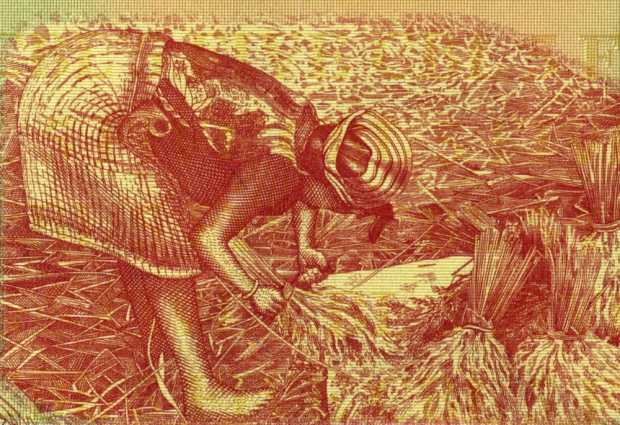Not a member yet? Sign Up!
Info
Please use real email address to activate your registration

"If we unite to increase food security for women, we also nourish the minds and bodies of whole communities" -
joint statement from the leaders of the Food and Agriculture Organization of the United Nations (FAO), the International Fund for Agricultural Development (IFAD) the World Food Programme (WFP) and the International Development Law Organization (IDLO) on International Women’s Day.

On the occasion of International Women’s Day, Aliansi Desa Sejahtera (The Alliance for Prosperous Villages) and Oxfam Indonesia featured seven female food heroes conscious of the fact that they are just examples of brave women fishers and farmers who produce food for Indonesians.

Habibah
SHRIMP PASTE, JAKARTA
During the monsoon season husband and wife fishers in Marunda Kepu, Jakarta Habibah and Ghobang, seek additional income by smoking milkfish and collecting clams and mussels.
Local residents know Habibah as a shrimp paste producer. Years ago it was easy for her to make such paste in large amount, earning good income for the family. When mangroves were still abundant in the area she also made other food products.
Climate change presents additional challenges to Habibah and fishers in Marunda Kepu where many are trapped in debt. Habibah’s shrimp paste is not even enough to make ends meet.
Habibah is now organizing savings and loans scheme in her community hoping that the fishers would one day become free of debts.

Jumiati
MANGROVE PRODUCTS, NORTH SUMATERA
Jumiati chairs the Muara Tanjung Women’s Group in Sei Ngalawan village, North Sumatera. She started with 12 women and eventually established Muara Tanjung Credit Union with a membership of 22. The Credit Union became the mainstay of fisher families in the village.
In the course of eight years the women’s group planted mangroves in stages. The mangroves, now 12 hectares large, are protecting the coastal area along Nagalawan Sei village. These mangrove forests have foster new activities in the area.
Led by Jumiati, women earn extra income for their families by processing mangroves into crackers, tea, syrup and sweet cakes.

Mama Rebecca
SERA’E, PAPUA
Mama Rebecca is active in empowering women in Samabusa village, Papua by teaching them the value of being independent, both economically and in food.
"We have to garden because we do not plant rice," Rebecca often told women in Samabusa.
Mama Rebecca is a connector between people of different tribes, mostly widows. She relinquished part of her farmland for the women to plant some crops. The gardening activities that Mama pioneered increased the groups’ earning and led them to represent Samabusa in a food competition at a regency level. They won the competition for promoting sera'e, a forgotten local food.

Marlina Rambu Meha
TUBERS & SORGHUM, EAST NUSA TENGGARA
"If we depend continuously from the outside world for our foods, it would be difficult to be independent. We used to have lots of local food choices such as mukano, katabi, taro, iwi and other types of tubers. Now only corn and rice are available,” said Rambu Meha, leader of Tapawalabadi Women’s Farmers Group in Sumba, East Nusa Tenggara.
The introduction of padi gogo rancah (rice on unirrigated land) in the 1980s displaced local rice varieties as well as sorghum species.
The Tapawalabadi group decided that local food self-sufficiency would be one of their main programs. They started with planting some crops such as cassava, peanuts, celery and more. Eventually the group exchanged seeds among members and revived kitchen gardens.

Siti Rahmah
ORGANIC VEGETABLES, SOUTH SULAWESI
Rahmah just started organic vegetable farming a few years back, but her work is felt directly by the family and the surrounding community in Pita Sunggu Village, South Sulawesi.
Since the 80s Pitu Sunggu, relied on their ponds and seaweeds for food sources. Farming was abandoned due to salt-water intrusion.
Pita Aksi Women Farmers Group was established late in 2010 and focused on planting organic vegetables, including cabbage, kale, celery, green eggplant, and mung beans. Members of the group are increasingly aware of the importance of protecting the environment and started using organic fertilizers, which they prepared themselves.

Siti Rofi'ah
BARLEY& SORGHUM, EAST NUSA TENGGARA
"Local Food is almost gone. About 90 percent of foods in Lembata, Nusa Tenggara came from outside the area. Through community gardens many people would know what sorghum, barley and juwawut look like and they would want to plant," Siti hopes.
In Lembata, Siti join KLOMPPALD, or Farmers Group to Buffer Sea and Land Abrasions, which has a membership of 27 groups of farmers, fishermen, ranchers, spread in 9 district, totaling almost a thousand people.
Before moving to Lembata, Siti led the Lembor Rice Farmers Alliance (APPEL) also in East Nusa Tenggara. The organizations is well respected West Manggarai and has reached 530 members. Siti’s dream was to revive local food wisdom where women are the holders of food spirit.

Suparjiyem
TUBERS, CENTRAL JAVA
Suparjiyem founded Menur Women Farmer Group. It has several activities including barns, land management, and savings and loans. Twenty-four years after its inception, Menur has been transformed into a creative group, with the same number of members. Many other farmers in the village of Wareng in Central Java emulated Menur’s initiatives.
Women now have the opportunity to voice their opinions in agricultural forum, dared to question policies that do not support the food sector. Most importantly, these women now understand their rights. Other activities undertaken by Suparjiyem and her group are to reintroduce tubers, food that is easy to grow in Wareng.
--------------------------------
We at Omar Niode Foundation admire these women and the challenges they are facing and thank Oxfam Indonesia and Aliansi Desa Sejahtera for arranging to meet the Female Food Heroes and providing their profiles
Images: OXFAM Indonesia, Aliansi Desa Sejahtera, Georgios Kollidos/Shutterstock